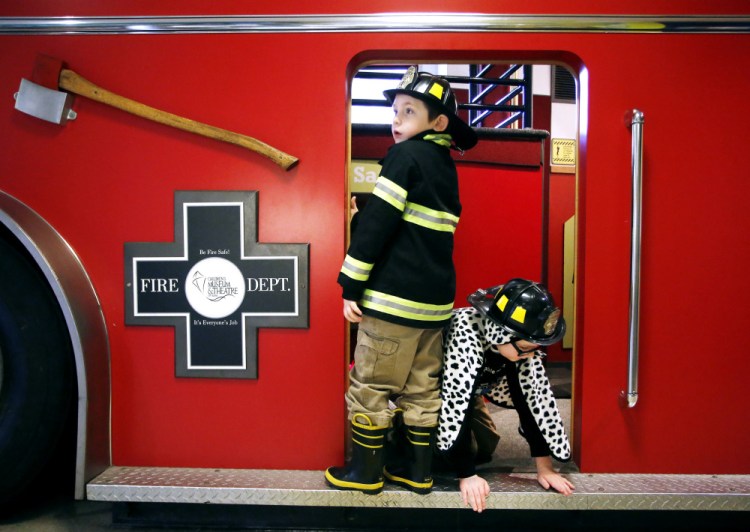Normally, Kelly Masters of Portland wouldn’t dream of bringing her 8-year-old twins, Jacob and Erik, anywhere near the Children’s Museum & Theatre of Maine on a Saturday morning in winter when cabin fever-fighting families descend on the Free Street institution.
The crowds, bright lights and the noise can be too much for her boys, who both have autism.
“This can be tricky to do,” said Masters.
So Masters said she was thrilled when the museum announced it was continuing its Play Our Way program and opening an hour early on Saturday to allow children with autism, Down syndrome and other challenges explore the exhibits without the usual chaos that results with large numbers of children at play.
Before the general public was let in, the museum staff turned down the lights and the sounds, and made noise-reducing headphones available.
About 20 children and their families showed up. Usually the museum holds hundreds of children – its capacity is 400 people – and on a Saturday there is a line at the door waiting for visitors to come out so the next visitors can go in. All the commotion can be overwhelming for some children.
Masters said simply finding a parking space out close to the museum’s entrance, usually an impossible task, made a difference.

Eleven-year-old Hannah Taylor of Westbrook, who is autistic, plays in an exhibit at the Children’s Museum on Saturday. Derek Davis/Staff Photographer
“Getting safely from the car can be difficult,” said Masters.
Hayley and Brian McCambridge of Westbrook trailed their sons, Asher, 4, and Milo, 2, as they made their way to the fire engine exhibit.
“Anything you want to check you can because this is a children’s museum,” Hayley McCambridge announced.
McCambridge said the program made it possible for Asher, who has autism, and Milo to check out the museum in a safe way.
“This might make it possible for us to come back another time,” said McCambridge.
She said being with other parents and children with sensory issues makes life easier.
“Everyone knows what it is to have a quirky kid,” she said.
McCambridge has just launched a new group on Facebook, called Greater Portland Autism Community, which focuses on resource sharing and creating group activities, similar to the Play Our Way program. In two weeks, the group has garnered 18 members, said McCambridge.
Usually Hannah Taylor, 11, of Westbrook wouldn’t be allowed to play in the museum’s toddler park, a fenced-off area intended for the museum’s littlest visitors. But on Saturday, Hannah, who has autism, had her run of the park, where she zeroed in on the fountain to play with scarves which ascend skyward with the aid of a forced air blower meant to mimic a spray of water.
“Your turn, three, two one, blast off,” Hannah said as she placed an armful of scarves over the contraption.
Lily O’Brien, an educator at the Children’s Museum & Theatre of Maine, said the museum staff enjoys the quiet as well. O’Brien spent one-on-one time with a preschooler fascinated by the tidal touch pool, which is normally jammed with children, requiring her to speak in a very loud voice.
“It’s great to connect with them,” said O’Brien.
O’Brien said the museum is committed to continuing the program, which originated with a grant from the Ronald McDonald House Charities of Maine, and is seeking new funding sources. The museum offers a limited number of scholarship memberships for families in need who wish to attend the Play Our Way program.
The next Play Our Way program is scheduled for March 6 at 9 a.m.
Send questions/comments to the editors.




Comments are no longer available on this story